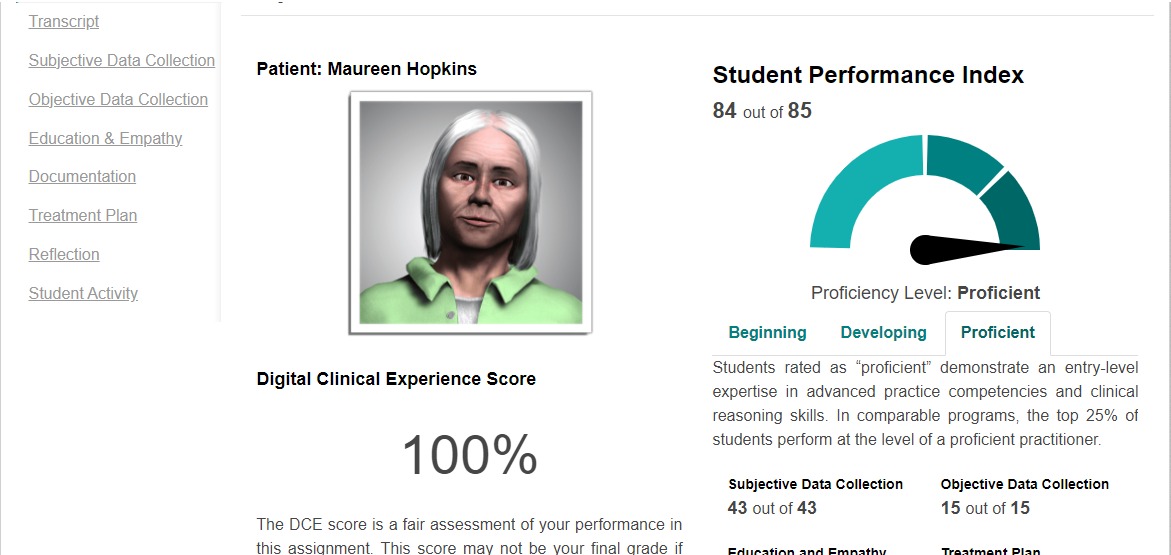Education & Empathy : 2 Of 4 (50.0%)
During the patient interview, there are a number of opportunities to provide patient education and empathy. The opportunities listed below are those identified by nursing experts to be of particular importance to this patient. A Model Statement is provided as an example of an appropriate response to each opportunity.
- Opportunities marked as Not Encountered are opportunities that were not elicited in the interview
- Opportunities marked as Not Followed Up are missed opportunities that were present in the interview, but where no statements were made
- Opportunities marked as Followed Up were followed up by students, and include the dialogue between student and patient
|
Description: Mrs. Hopkins reports recent changes to her hypothyroidism medication. |
||
|
Have you had changes in your mouth and throat? |
Question |
|
|
Hm . . . well, I did notice a while back that my Synthroid looked different when I picked it up from the pharmacy. It was a sort of oblong pill shape, whereas it’s usually circular. And the pill bottle read “levothyroxine sodium,” instead of “Synthroid” like usual. |
||
|
Have you had changes in frequency of urinating? |
Question |
|
|
Hm . . . well, I did notice a while back that my Synthroid looked different when I picked it up from the pharmacy. It was a sort of oblong pill shape, whereas it’s usually circular. And the pill bottle read “levothyroxine sodium,” instead of “Synthroid” like usual. |
||
|
Any pain when urinating? (Clarified to: Do you have trouble urinating?) |
Question |
|
|
I haven’t had any issues in the bathroom or the like. [AUDIO COMING SOON] (Clarified to: if I have trouble urinating) |
||
|
Do you experience pain when moving? (Clarified to: Does it hurt to walk?) |
Question |
|
|
Model Statement: “It sounds like your pharmacy has made some changes in how they’ve dispensed your Synthroid medication and have changed the name and shape of the medication. While pharmacies sometimes make medication changes from brand name to generic to save you money, you should be on the lookout for any changes to the name, shape, and color, as some medications need to be dispensed as written to achieve the best health outcomes. If you notice changes to your medication, ask your pharmacy about them before you leave the pharmacy, and check in with your primary care provider.” |
|
Description: Mrs. Hopkins reports walking for exercise. |
||
|
Do you experience pain when moving? (Clarified to: Does it hurt to walk?) |
Question |
|
|
No, not at all. I like walking. (Clarified to: if it hurts to walk) |
||
|
Have you had headaches? |
Question |
|
|
I haven’t had any headaches. [AUDIO COMING SOON] |
||
|
Have you had changes in appetite? |
Question |
|
|
My appetite’s the same as it usually is. [AUDIO COMING SOON] |
||
|
Model Statement: “It’s great that you are taking a walk once a week for exercise, especially given the positive effects this can have on your health. However, you are not currently exercising at the recommended frequency or intensity for health maintenance. Exercising more often and at a moderate, but manageable, intensity can have positive effects on your overall health and aid the management of your osteopenia.” |
|
Description: Mrs. Hopkins reports frustration with her recent hair loss. |
||
|
What brings you to he clinic today? |
Question |
|
|
I came in because I’ve been really tired lately. And I’ve had some hair loss. Neither of which are really normal for me. |
||
|
am sorry to hear this |
Empathize |
|
|
Thank you. |
||
|
Model Statement: “I’m sorry to hear that you have been experiencing hair loss. It sounds like it has been disturbing and frustrating to look in the mirror and not see your usual self. We are going to investigate more into your signs and symptoms to determine the underlying causes of your hair loss and how we might address it.” |
|
Description: Mrs. Hopkins reports feeling abnormally fatigued recently. |
||
|
What aggravates your fatigue |
Question |
|
|
I don’t think anything makes it worse — it’s more just a steady tiredness that lasts all day. |
||
|
How has these affected your daily activities? (Clarified to: How has your fatigue made it difficult to do things?) |
Question |
|
|
It hasn’t — I can still perform my daily activities. (Clarified to: how my fatigue has made it difficult to do activities) |
||
|
that’s great |
Empathize |
|
|
Thank you, dear. |
||
|
Model Statement: “I’m sorry to hear you have been feeling fatigued recently. It can be very frustrating to feel like you’re moving slower and having lower energy levels to complete your daily activities. Let’s discuss your symptoms of fatigue more thoroughly so we can determine possible causes and how best to address them moving forward.” |

